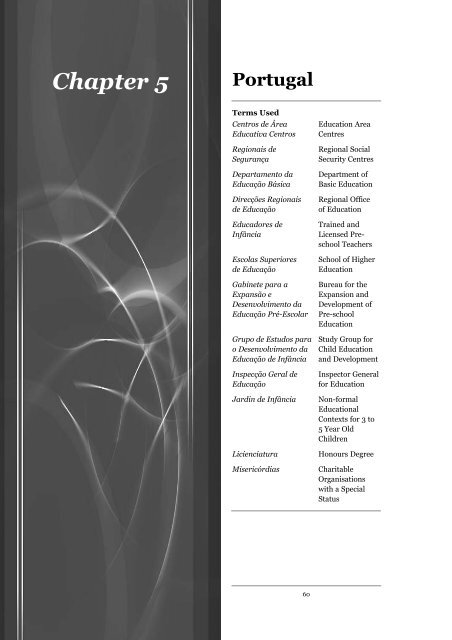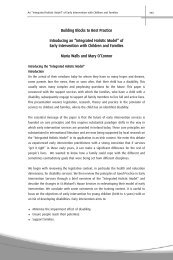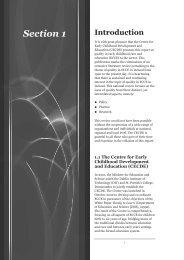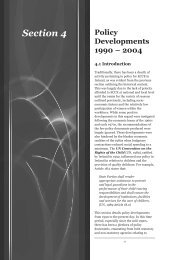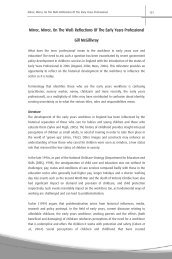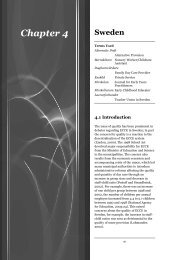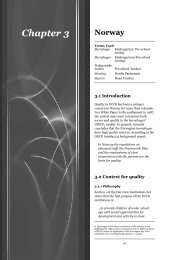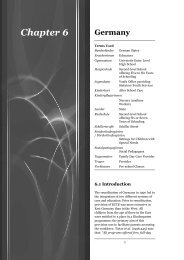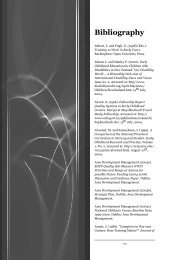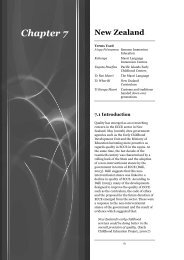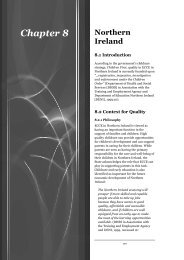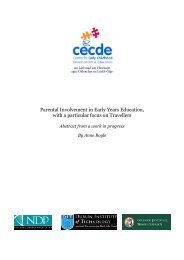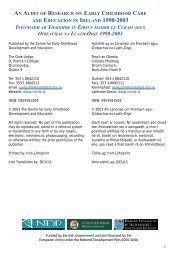Portugal - Centre for Early Childhood Development & Education
Portugal - Centre for Early Childhood Development & Education
Portugal - Centre for Early Childhood Development & Education
Create successful ePaper yourself
Turn your PDF publications into a flip-book with our unique Google optimized e-Paper software.
Chapter 5<br />
<strong>Portugal</strong><br />
Terms Used<br />
Centros de Área<br />
Educativa Centros<br />
Regionais de<br />
Segurança<br />
Departamento da<br />
Educação Básica<br />
Direcções Regionais<br />
de Educação<br />
Educadores de<br />
Infância<br />
Escolas Superiores<br />
de Educação<br />
Gabinete para a<br />
Expansão e<br />
Desenvolvimento da<br />
Educação Pré-Escolar<br />
<strong>Education</strong> Area<br />
<strong>Centre</strong>s<br />
Regional Social<br />
Security <strong>Centre</strong>s<br />
Department of<br />
Basic <strong>Education</strong><br />
Regional Office<br />
of <strong>Education</strong><br />
Trained and<br />
Licensed Preschool<br />
Teachers<br />
School of Higher<br />
<strong>Education</strong><br />
Bureau <strong>for</strong> the<br />
Expansion and<br />
<strong>Development</strong> of<br />
Pre-school<br />
<strong>Education</strong><br />
Grupo de Estudos para Study Group <strong>for</strong><br />
o Desenvolvimento da Child <strong>Education</strong><br />
Educação de Infância and <strong>Development</strong><br />
Inspecção Geral de<br />
Educação<br />
Jardin de Infância<br />
Licienciatura<br />
Misericórdias<br />
Inspector General<br />
<strong>for</strong> <strong>Education</strong><br />
Non-<strong>for</strong>mal<br />
<strong>Education</strong>al<br />
Contexts <strong>for</strong> 3 to<br />
5 Year Old<br />
Children<br />
Honours Degree<br />
Charitable<br />
Organisations<br />
with a Special<br />
Status<br />
60
Chapter 5<br />
<strong>Portugal</strong><br />
5.1 Introduction<br />
According to Wall et al. (2001:2):<br />
<strong>Portugal</strong> is usually described as a<br />
country with a strong and explicit<br />
ideological commitment to the family,<br />
but a low profile as far as family and<br />
child policies are concerned. The idea<br />
of a rudimentary welfare State<br />
underlines the precariousness of state<br />
provision, especially of care services,<br />
which are compensated by traditional<br />
welfare guarantees stemming from<br />
strong families and in<strong>for</strong>mal support<br />
networks.<br />
Despite this, there have been some changes<br />
over the last two decades in the provision of<br />
care and education services <strong>for</strong> children.<br />
Two distinct systems can be seen in<br />
<strong>Portugal</strong>, a system focused on the care of<br />
young children and a system focused on the<br />
education of children aged three to six. Preschool<br />
education in <strong>Portugal</strong> is legally<br />
defined as education provided <strong>for</strong> children<br />
between the ages of three and six. Hence<br />
the term pre-school has a different meaning<br />
in <strong>Portugal</strong> than other European countries,<br />
where it is used to describe settings <strong>for</strong><br />
young children from birth to the beginning<br />
of compulsory schooling. Policy relating to<br />
the development of <strong>for</strong>mal childcare<br />
facilities <strong>for</strong> very small children below age<br />
three has not been as high on the political<br />
agenda as pre-school education.<br />
5.2 Context <strong>for</strong> Quality<br />
5.2.1 Philosophy<br />
In focusing primarily on pre-school<br />
education <strong>for</strong> children over the age of three,<br />
childcare in <strong>Portugal</strong> "...has essentially<br />
been envisaged from the point of view of<br />
the child's education career, rather than<br />
from the point of promoting the<br />
reconciliation of work and family life."<br />
(Wall et al., 2001:4).<br />
5.2.2 Policy<br />
Policy responsibility <strong>for</strong> ECCE in <strong>Portugal</strong><br />
is shared by two ministries, the Ministry of<br />
<strong>Education</strong> and the Ministry of Labour and<br />
Solidarity. This mirrors the division that<br />
exists in <strong>Portugal</strong> between provision that is<br />
deemed to have an educational function<br />
and provision that is deemed to have a<br />
caring function (OECD, 2001). The<br />
Ministry of <strong>Education</strong> has responsibility <strong>for</strong><br />
pedagogical quality in all educational<br />
settings. The Ministry of Labour and<br />
Solidarity has responsibility <strong>for</strong> family<br />
support provision <strong>for</strong> children aged 3<br />
months and older (OECD, 2001). All<br />
published legislation is the joint<br />
responsibility of the Ministry of <strong>Education</strong><br />
and the Ministry of Labour and Solidarity<br />
(OECD, 1998b).<br />
While policy is conceptualised, defined,<br />
planned, co-ordinated, inspected and<br />
evaluated at national level, the OECD<br />
(2000a) notes that there is a great degree<br />
of de-concentration, if not full<br />
decentralisation, in pedagogical action and<br />
the support provided to the management of<br />
human, material and financial resources. In<br />
the case of the Ministry of <strong>Education</strong>, this<br />
is achieved through the Direcções<br />
Regionais de Educação (DRE or Regional<br />
Office of <strong>Education</strong>), which integrate the<br />
Centros de Área Educativa (<strong>Education</strong><br />
Area <strong>Centre</strong>s) at the district level (OECD,<br />
2000a). The DRE give co-ordination and<br />
support to the educational settings and<br />
manages human, material and financial<br />
resources in these settings. Within the<br />
Ministry of Labour and Solidarity,<br />
decentralisation is achieved through the<br />
Centros Regionais de Segurança Social<br />
(CRSS or Regional Social Security <strong>Centre</strong>s)<br />
and their sub-regional services. The CRSS<br />
support the social aspects of the child<br />
within educational contexts, organising and<br />
accepting financial responsibility <strong>for</strong> meals,<br />
transport and extracurricular activities.<br />
61
Chapter 5<br />
<strong>Portugal</strong><br />
In recent years, the Ministry of <strong>Education</strong><br />
and the Ministry of Labour and Solidarity<br />
have attempted to co-ordinate their<br />
activities through the establishment of<br />
<strong>for</strong>mal institutional lines to promote<br />
dialogue and co-operation. In 1996, a<br />
Bureau <strong>for</strong> the Expansion and <strong>Development</strong><br />
of Pre-school <strong>Education</strong> (Gabinete para a<br />
Expansão e Desenvolvimento da Educação<br />
Pré-Escolar) was established, in an attempt<br />
to promote co-ordination in the ECCE<br />
sector. This Bureau brought together major<br />
stakeholders in the ECCE sector including<br />
the two Ministries, the Consulting Council<br />
of Representatives of the National<br />
Association of Municipalities, the Union of<br />
Private and Social Solidarity Institutions<br />
(IPSS), the Association of Private and<br />
Cooperative <strong>Education</strong> and the Unions of<br />
the Misericórdias and Mutual Trusts. The<br />
main aim of the Bureau is to provide a<br />
concerted framework to promote the<br />
expansion of the pre-school network as<br />
required and to contribute to the<br />
improvement of the quality of provision<br />
(OECD, 1998b).<br />
A government Programme <strong>for</strong> the<br />
Expansion and <strong>Development</strong> of Pre-school<br />
<strong>Education</strong> was drafted in 1996 and was<br />
followed in 1997 by the Framework Law,<br />
which co-ordinated the diverse provision<br />
<strong>for</strong> young children, and included <strong>for</strong> the<br />
first time the three-to-six-year-olds within<br />
the realm of basic education. The<br />
government programme intends that the<br />
expansion and development of pre-school<br />
provision should take place in coordination<br />
with municipal, private and<br />
social welfare institutions, with central<br />
government assuming a guiding and<br />
regulatory role.<br />
While there are moves towards<br />
decentralisation of ECCE in <strong>Portugal</strong>, these<br />
moves have been resisted by professionals<br />
who argued against the withdrawal of State<br />
responsibility (Oberhumeur and Ulich,<br />
1997:27). Much of the implementation of<br />
ECCE in <strong>Portugal</strong> depends on municipality<br />
initiatives (Clearinghouse, 2003c).<br />
5.2.3 Funding<br />
The main source of funding in <strong>Portugal</strong> is<br />
supply side subsidies (Candappa et al.,<br />
2003). In pre-schools belonging to the<br />
public network, the operating costs are<br />
shouldered by the M.E. (educational<br />
component) and the M.L.S. (social<br />
component), although financial<br />
responsibility <strong>for</strong> the "social" component<br />
may be transferred by agreement to the<br />
local authorities (Wall et al., 2001). In preschools<br />
belonging to private non-profit<br />
institutions, the State pays <strong>for</strong> 62 per cent<br />
of expenditures and families pay <strong>for</strong> 38 per<br />
cent. Funding is carried out on the basis of<br />
the cost of each child, and the amount per<br />
child is fixed annually by the State (jointly<br />
by the M.E. and the M.L.S.) after hearing<br />
the organisations that represent the<br />
interests of these institutions. In private<br />
and cooperative school establishments,<br />
families pay <strong>for</strong> almost all expenditures (95<br />
per cent); families are supposed to shoulder<br />
the costs here, but the law on pre-school<br />
education allows <strong>for</strong> some sponsorship in<br />
these schools via the establishment of<br />
special development programmes. Only the<br />
public sector requires no fees from parents.<br />
Average costs to parents <strong>for</strong> childcare<br />
amount to about 11 per cent of an average<br />
aggregate family salary.<br />
In <strong>Portugal</strong>, compulsory schooling begins at<br />
age 6. According to Wall (2000:38):<br />
…child care facilities are lacking in<br />
<strong>Portugal</strong>. There are hardly any<br />
nurseries <strong>for</strong> children below age<br />
three, because the state considers<br />
childcare a purely educational task.<br />
For this reason, the current offer only<br />
comprises pre-school day nurseries<br />
<strong>for</strong> children above three. Many care<br />
facilities are open only five hours per<br />
day and close during lunch.<br />
Historically, <strong>Portugal</strong> has had a relatively<br />
low level of day care provision <strong>for</strong> those<br />
under the age of three (Lindon, 2000).<br />
However there is growing awareness of the<br />
need <strong>for</strong> provision <strong>for</strong> 0-3 year old children<br />
62
Chapter 5<br />
<strong>Portugal</strong><br />
(Wall 2003) and the expansion of preschool<br />
education is now a high government<br />
priority (Lindon, 2000).<br />
Policy measures have been largely focused<br />
on the expansion of pre-school education.<br />
This involves free access to a five-hour preschool<br />
session <strong>for</strong> all five year olds. It is<br />
planned to extend this provision to all fouryear<br />
olds in the near future (OECD, 1998b).<br />
Female employment, social need and the<br />
population of three-six year olds in an area<br />
are the main criteria <strong>for</strong> government choice<br />
of where the expansion of pre-school<br />
services should take place.<br />
Ninety percent of those aged five-six,<br />
seventy per cent of those aged four-five and<br />
sixty per cent of children aged three-four<br />
are enrolled in a pre-school (OECD, 2001).<br />
Among children under the age of three,<br />
almost 90 per cent are cared <strong>for</strong> by their<br />
families or through in<strong>for</strong>mal childcare<br />
arrangements. Just twelve per cent of<br />
children aged birth-three are cared <strong>for</strong> in<br />
crèches or by family day care providers<br />
(OECD, 2001).<br />
(no more than one tenth of all users) while<br />
the State-supported "third sector" includes<br />
over 80 per cent of all users (Wall et al.,<br />
2001:4). The private profit-making sector<br />
compensates <strong>for</strong> the remaining gaps.<br />
Wall et al. (2001) note that in <strong>Portugal</strong>,<br />
responsibility <strong>for</strong> the development of preschool<br />
education is shared by three distinct<br />
sectors, the public sector (establishments<br />
belonging to local authorities and to<br />
national government, either the Ministry of<br />
<strong>Education</strong> or the Ministry of Labour and<br />
Solidarity), the private non-profit making<br />
sector and the private (<strong>for</strong> profit) sector.<br />
According to Wall et al. (2001), in 1998-99,<br />
the private share (profit and non-profitmaking)<br />
of establishments <strong>for</strong> the three to<br />
five age groups in terms of the proportion<br />
of users was 54 per cent (almost two thirds<br />
(63 per cent) of this share belonging to the<br />
private not-<strong>for</strong>-profit sector). The<br />
importance of the private sector is greater<br />
in urban areas such as Lisbon (75 per cent),<br />
Porto (67 per cent) and the Setubal<br />
peninsula (75 per cent).<br />
5.2.4 Delivery Strategies<br />
According to Wall et al. (2001), the main<br />
role of the State is as a coordinator, planner<br />
and financial supporter of services rather<br />
than a direct provider. The ECCE network<br />
in <strong>Portugal</strong> is both public and private.<br />
In the case of children aged birth to three,<br />
services are either established by the<br />
Ministry of Labour and Solidarity itself or<br />
by other entities such as private individuals'<br />
co-operatives, IPSS or other non-profit<br />
institutions. Services <strong>for</strong> children under the<br />
age of three is largely provided by the<br />
voluntary sector (particularly non-profit<br />
social solidarity institutions and<br />
establishments belonging to the<br />
Misericórdias and parents who are<br />
responsible <strong>for</strong> paying <strong>for</strong> some of the costs<br />
of childcare arrangements. The State<br />
(M.L.S.) provides early childhood<br />
institutions <strong>for</strong> a small proportion of users<br />
5.3 Defining Quality<br />
5.3.1 Regulation<br />
The Framework Law <strong>for</strong> Pre-School<br />
<strong>Education</strong>, published in 1997, established<br />
the juridical framework <strong>for</strong> pre-school<br />
education in <strong>Portugal</strong> (Vasconcelos, 1998).<br />
Under this Law, pre-school education is<br />
viewed as the first step in basic education,<br />
providing an important foundation <strong>for</strong> life<br />
long learning (Vasconcelos, 1997b). The<br />
Jardin de Infância 12 is identified as a<br />
"…transitional site between family and<br />
school." (Vasconcelos, 1998:5)<br />
The Framework Law outlines principles<br />
regarding the structure, organisation,<br />
12 Jardins de Infância are non-<strong>for</strong>mal educational contexts<br />
<strong>for</strong> three to five year old children, where both children and<br />
adults are supervised by specialised staff. Children are given<br />
opportunities to develop learning skills through self-discovery<br />
and communication with other children and adults.<br />
63
Chapter 5<br />
<strong>Portugal</strong><br />
pedagogical and financial aspects of preschool<br />
education (OECD, 1998b) as follows;<br />
in article 5 (strategic role of the State),<br />
article 8 (Pedagogical and Technical<br />
Responsibilities), article 11 (Pedagogical<br />
Directives), article 18 (Staff), article 19<br />
(Training and Provision of Cultural<br />
Activities), and articles 20 and 21<br />
(Evaluation and Inspection) (OECD,<br />
1998b). The role of the State is set out<br />
under Article 5:<br />
To establish the general norms <strong>for</strong><br />
pre-school education, especially in<br />
terms of organisational, pedagogic<br />
and technical aspects, and to ensure<br />
their fulfilment and application by<br />
means of monitoring, assessment and<br />
inspection. (Vasconcelos, 1998:13)<br />
Under Article 8, the State is responsible <strong>for</strong><br />
defining the general guidelines controlling<br />
pre-school education (especially in<br />
pedagogic and technical terms) and has the<br />
power to define rules <strong>for</strong> the activities of<br />
nursery schools, to define syllabus<br />
objectives and guidelines, to define the<br />
qualification requirements of teaching and<br />
non teaching staff and to define and<br />
provide training requirements<br />
(Vasconcelos, 1998). The State also has the<br />
power to define the rules <strong>for</strong> assessing the<br />
quality of pre-school provision and to<br />
undertake monitoring and inspection.<br />
The Framework Law appeals to the<br />
participation of local structures, parents'<br />
associations, residents' associations, civic<br />
organisations and others in the pre-school<br />
educational process. It requires parents to<br />
participate in pre-school education.<br />
According to Article 4, parents and<br />
guardians have a role to participate in the<br />
running of pre-schools, either through<br />
representatives elected <strong>for</strong> that purpose or<br />
through representative associations.<br />
Parents also have a role to play in<br />
developing a co-operative relationship with<br />
teachers and staff, voicing their opinion on<br />
the opening hours of the facility and<br />
participating under the pedagogical<br />
guidance of the educational context, as<br />
volunteers, in educational activities.<br />
5.3.2 Curriculum<br />
National curriculum guidelines <strong>for</strong> Preschool<br />
<strong>Education</strong> were legally established<br />
in 1997 and became binding in 1998-99<br />
(Vasconcelos, 1998). These require the<br />
Jardin de Infância to address educational<br />
issues, both public and private, whether<br />
they are organised by the Ministry of<br />
<strong>Education</strong> or the Ministry of Labour and<br />
Solidarity. The OECD (2000a) note that<br />
this shows the keenness of the State to<br />
accept responsibility <strong>for</strong> the raising of<br />
quality in ECCE. The curriculum<br />
guidelines:<br />
…are a statement of what children<br />
should learn in pre-school. The<br />
curriculum guidelines aim to give<br />
greater visibility to pre-school<br />
education, facilitating educational<br />
continuity with elementary school.<br />
They also aim to improve the quality<br />
of pre-school education by<br />
introducing innovative dynamics that<br />
will stimulate pedagogical activity.<br />
(Vasconcelos, 1998:8)<br />
The curriculum guidelines are designed to<br />
help practitioners make day to day<br />
decisions about practice (Vasconcelos,<br />
1998) and are a common reference points<br />
to guide the work undertaken by pre-school<br />
teachers. They are guidelines, not a<br />
prescriptive list of targets to be realised<br />
(Vasconcelos, 1998). The curriculum<br />
guidelines lay out the general principles<br />
and pedagogical aims of the Pre-school<br />
Law. In addition, they define the overall<br />
guidelines <strong>for</strong> the pre-school practitioner in<br />
relation to observing, planning, acting,<br />
assessing communicating and articulating<br />
(Vasconcelos, 1997a).<br />
The introduction of curriculum guidelines<br />
<strong>for</strong> pre-school education is seen as an<br />
important measure in ensuring the quality<br />
of the national network of pre-school<br />
64
Chapter 5<br />
<strong>Portugal</strong><br />
educational facilities, whether public or<br />
private (Vasconcelos, 1998). As Vasconcelos<br />
(1996:12) states:<br />
Curriculum guidelines are seen as an<br />
important part of the regulatory role<br />
of the state in order to provide<br />
educational quality to all pre-school<br />
programs.<br />
The curriculum guidelines are organised<br />
into three content areas:<br />
1. Personal and social development;<br />
2. Expression and communication<br />
(which includes mastering different<br />
<strong>for</strong>ms of expression, mastering<br />
language and an initial approach to<br />
reading, writing and mathematics)<br />
and;<br />
3. Knowledge of the world<br />
(Vasconcelos, 2002).<br />
5.4 Measuring Quality<br />
5.4.1 Inspection<br />
Regulation is the responsibility of the State<br />
(OECD, 1998b). The Ministry of <strong>Education</strong><br />
is responsible <strong>for</strong> the supervision and<br />
inspection of the pre-school education<br />
system. The Inspecção Geral de Educação<br />
(Inspector General <strong>for</strong> <strong>Education</strong>) is<br />
responsible <strong>for</strong> the regulation and coordination<br />
of pre-schools and can use legal,<br />
administrative, financial and eventually,<br />
disciplinary mechanisms to correct any<br />
situation found to be inadequate (OECD,<br />
1998b).<br />
The Inspector-General <strong>for</strong> <strong>Education</strong> is also<br />
responsible <strong>for</strong> the development of<br />
per<strong>for</strong>mance evaluation mechanisms<br />
(OECD, 1998b). According to the Inspector<br />
General, the main quality objectives of preschool<br />
provision are as follows:<br />
<br />
<br />
<br />
Planning of educational activity;<br />
Administrative organisation;<br />
Organisation of the educational<br />
environment;<br />
<br />
<br />
<br />
<br />
Content development as described in<br />
curriculum guidelines;<br />
Children observation practices;<br />
Pedagogical relations;<br />
Resource management (OECD,<br />
1998b:74).<br />
Specific objectives, together with<br />
observation criteria measured on four-point<br />
quality scales, were set in all the above<br />
activity areas. Evaluations are carried out<br />
by an inspector on a national random<br />
sample of Jardins de Infância. The<br />
evaluative nature of the inspection process<br />
involves teachers in the discussion of the<br />
in<strong>for</strong>mation gathered. Inspectors assess the<br />
quality of the "implemented curriculum"<br />
and the quality of the "achieved<br />
curriculum" (OECD, 1998b:75), as well as<br />
the quality of the learning experiences<br />
provided:<br />
Thus, the aim of the Pedagogical<br />
Audit Project carried out by the<br />
Inspector-General of <strong>Education</strong> is to<br />
contribute to the quality control<br />
process of the educational provision<br />
offered by the Portuguese Jardins de<br />
Infância through a <strong>for</strong>m of external<br />
evaluation based on joint<br />
diagnostic/improvement practices.<br />
(OECD, 1998b:75)<br />
Inspections identify the strengths and<br />
weaknesses of the operation and<br />
operational conditions of the Jardins de<br />
Infância (OECD, 1998b). Forms of<br />
childcare provision under the auspices of<br />
the Ministry of Labour and Solidarity are<br />
supervised and inspected by the Ministry's<br />
Inspector General, the Social Security<br />
Regional <strong>Centre</strong>s and the Sub-Regional<br />
Services. According to its own Organic Law,<br />
the objectives of the Inspectorate General<br />
are to supervise and inspect the following<br />
operational aspects of all the Ministry's<br />
services and institutions:<br />
<br />
Abidance to the Law and the rules<br />
leading to the good operation of the<br />
services and institutions;<br />
65
Chapter 5<br />
<strong>Portugal</strong><br />
<br />
<br />
Efficient management and<br />
administration, legality of processes and<br />
decisions adopted as well as the<br />
frequency of financial transactions;<br />
Adaptation of norms to requirements<br />
and eventual need <strong>for</strong> new strategies<br />
(OECD, 1998b:54).<br />
structural quality in <strong>Portugal</strong>, with ECERS<br />
scores significantly higher in southern as<br />
opposed to northern <strong>Portugal</strong>.<br />
5.5 Supporting Quality<br />
5.4.2 Quality Measured Using ECERS<br />
The ICCE project was a cross-national<br />
study that considered quality in centrebased<br />
ECCE programmes <strong>for</strong> children aged<br />
three to six years of age across five<br />
countries, including <strong>Portugal</strong> (Tietze et al.,<br />
1996). Two scales, the ECERS and the CIS,<br />
were used to observe process quality in preschool<br />
classrooms across these countries<br />
(Tietze et al., 1996). Considerable ef<strong>for</strong>t<br />
was made to ensure that the scales were<br />
applicable to all countries selected and that<br />
interpretation of all items on the scales was<br />
consistent. In terms of ECERS scores, no<br />
classroom in <strong>Portugal</strong> was found to have<br />
scores in the lowest quality range<br />
(inadequate). However of the five countries,<br />
<strong>Portugal</strong> had the fewest classrooms in the<br />
highest quality range (Tietze et al.,<br />
1996:464). <strong>Portugal</strong> was found to have<br />
highest scores across the dimension of<br />
providing more or less "…personalised<br />
care…" in settings but scored low on the<br />
dimension "…availability and use of space<br />
and play materials…" Adequate space and<br />
materials <strong>for</strong> a variety of play activities in<br />
order to encourage children to develop<br />
skills in many rather than a few<br />
developmental areas was necessary <strong>for</strong> a<br />
high score on this dimension of quality, and<br />
the results suggest that Portuguese preschools<br />
were lacking in this regard.<br />
In looking at the relations between<br />
structural and process quality across<br />
several countries, Cryer et al. (1999) noted<br />
that in <strong>Portugal</strong>, teacher experience,<br />
enrolment size, hours opened and director<br />
experience were the structural<br />
characteristics that best predicted<br />
classroom process quality. The researchers<br />
also found significant regional variations in<br />
5.5.1 Staff Training<br />
There is a recognition that no plan <strong>for</strong> the<br />
expansion of high quality ECCE will be<br />
possible without ECCE professionals<br />
(Vasconcelos, 1996). All Jardins de<br />
Infância are staffed by trained and licensed<br />
pre-school teachers called educadores de<br />
infância (OECD, 2000a). All pre-school<br />
settings have a pedagogical director who is<br />
a qualified pre-school teacher (OECD,<br />
1998b). However, it is suggested that<br />
teachers working in private non-profit<br />
organisations have a lower level of training<br />
than those working in the public sector<br />
(OECD, 2000a).<br />
Professionals that work in other <strong>for</strong>ms of<br />
childcare provision, other than Jardins de<br />
Infância, include educadores de infância,<br />
nurses and social workers, all of whom<br />
have tertiary-level qualifications, and<br />
auxiliary workers who are not required to<br />
have a particular qualification. Even when<br />
qualified, staff working in these facilities<br />
have a lower level of status, pay and<br />
working conditions than those employed in<br />
the Jardins de Infância. Some action has<br />
been taken to raise the qualification of<br />
those working in these settings and under<br />
Framework Law, IPSS settings must have<br />
at least one pre-school teacher per<br />
classroom in order to qualify <strong>for</strong><br />
government funding.<br />
Educadores de infância undertake a fouryear<br />
course of study leading to an honours<br />
degree (licienciatura) at either a university<br />
or a school of higher education (Escolas<br />
Superiores de Educação). Pre-school<br />
teachers who have completed the four year<br />
degree receive the same starting salaries in<br />
public pre-school provision as primary<br />
teachers who have received the same level<br />
66
Chapter 5<br />
<strong>Portugal</strong><br />
of training. By law, teachers have<br />
recognised working hours <strong>for</strong> the<br />
preparation of materials and have team<br />
meeting as well as parent meetings<br />
(Vasconcelos, 2002). They also have a<br />
professional association, the Association <strong>for</strong><br />
Professionals of <strong>Early</strong> <strong>Childhood</strong><br />
(Vasconcelos, 2002).<br />
5.5.2 Professional <strong>Development</strong><br />
Vasconcelos (2002:52) notes that one<br />
political measure taken in the last few years<br />
was "…systematic in-service training (if<br />
possible centre based) <strong>for</strong> all early<br />
childhood teachers, whether they work at<br />
public or private institutions." In-service<br />
training is offered by a variety of different<br />
bodies, including training centres or by<br />
public and private entities, many of whom<br />
have developed training programmes in<br />
partnership with teacher training colleges.<br />
Training <strong>Centre</strong>s are local municipal or<br />
inter-municipal centres established with<br />
the following aims:<br />
<br />
<br />
<br />
<br />
<br />
To contribute to in-service training<br />
promotion;<br />
To promote the exchange and<br />
publication of pedagogical experiences;<br />
To promote identification of training<br />
needs;<br />
To regulate training provision in<br />
accordance with national and local<br />
needs meeting, whenever possible,<br />
teachers individual requirements <strong>for</strong><br />
assistance with training;<br />
To set up and manage resource centres<br />
(OECD, 1998b:84).<br />
There are 211 centres operating in <strong>Portugal</strong>.<br />
Vasconcelos (2002) notes that courses have<br />
been offered to practitioners in order to<br />
complete their degrees.<br />
5.5.3 Parents<br />
Parents are recognised by law as partners<br />
in pre-school education (Vasconcelos,<br />
2002) and are seen as essential <strong>for</strong> the<br />
achievement of maximum outcomes <strong>for</strong><br />
children:<br />
They need to cooperate in the<br />
organisation of kindergartens and<br />
they are expected to participate in<br />
parent associations. They are also<br />
represented in the Board of each<br />
kindergarten and have a word to say<br />
in the educational project of the<br />
kindergarten. (Vasconcelos, 2002:53)<br />
Parents are also consulted by the Ministry<br />
of <strong>Education</strong> regarding policy in ECCE.<br />
Mooney et al. (2003) state that the level of<br />
parental involvement in pre-schools in<br />
<strong>Portugal</strong> is low, despite the legislative<br />
importance given to parental involvement.<br />
They suggest that this may be due to the<br />
fact that <strong>Portugal</strong> has one of the highest<br />
rates of maternal employment among<br />
Western European countries, and on<br />
average, the longest working hours.<br />
5.5.4 Research<br />
Several research projects have been<br />
completed in the last decade in <strong>Portugal</strong><br />
(OECD 1998b). For example, the<br />
Departamento da Educação Básica<br />
translated and adapted the EEL materials<br />
and provided teacher training throughout<br />
the country to adapt and disseminate a<br />
model of quality evaluation and<br />
improvement among ECCE professionals<br />
working in all three networks of Jardins de<br />
Infância. Other research carried out<br />
included research conducted by the Lisbon<br />
School of <strong>Education</strong> around curriculum,<br />
early development, and quality issues and<br />
research conducted by the Institute of Child<br />
Studies in the University of Minho. (OECD,<br />
1998b)<br />
According to the OECD (1998b) report, the<br />
Grupo de Estudos para o Desenvolvimento<br />
da Educação de Infância (Study Group <strong>for</strong><br />
Child <strong>Education</strong> and <strong>Development</strong>) was<br />
preparing the first issue of a research<br />
journal in ECCE, covering children from<br />
67
Chapter 5<br />
<strong>Portugal</strong><br />
birth to the end of the first cycle of basic<br />
education.<br />
The <strong>Development</strong> of Pedagogical<br />
Knowledge in the <strong>Education</strong> and Training<br />
Systems Research <strong>Centre</strong> (located in the<br />
University of Aveiro) was established by<br />
researchers from the University of Aveiro,<br />
the University of Algarve, the University of<br />
Coimbra and the Higher Institute of<br />
<strong>Education</strong> of the Polytechnic Institute of<br />
Coimbra. It is currently carrying out several<br />
projects in ECCE. This includes a project<br />
entitled Promoting Quality in <strong>Early</strong><br />
<strong>Childhood</strong> <strong>Education</strong>. Some perspectives of<br />
intervention and research have been<br />
identified and there are three quality<br />
approaches which frame the project. These<br />
are the:<br />
<br />
<br />
<br />
Enrichment of the environment<br />
(physical environment and learning<br />
experiences in different developmental<br />
areas - motor, cognitive-linguistic,<br />
affective-social...);<br />
Adult style (sensitivity, stimulation,<br />
autonomy promotion) and;<br />
Family and community involvement<br />
(University of Aveiro, Accessed at:<br />
http://www.ii.ua.pt/, 1st July, 2004).<br />
Areas of training, intervention and research<br />
include initial and ongoing training <strong>for</strong><br />
early childhood and elementary teachers,<br />
teaching practice, early intervention and<br />
work with families (University of Aveiro,<br />
Accessed at: http://www.ii.ua.pt/, 1st July,<br />
2004).<br />
Other projects undertaken by the university<br />
include the early intervention project of<br />
Aveiro (a promotion strategy <strong>for</strong> the wellbeing<br />
and global development of children<br />
less than six years of age and their families,<br />
identified as being at risk) and a project on<br />
constructing quality in infant day care. This<br />
project aims to develop a database of<br />
quality patterns validated by the scientific<br />
community, others professionals and<br />
parents. Furthermore, it aims to promote in<br />
the adherent day-care centres to the<br />
project, by means of a participatory process<br />
of analysis, a manual <strong>for</strong> quality,<br />
considering the proposed quality patterns<br />
and its own specifications (University of<br />
Aveiro, Accessed at: http://www.ii.ua.pt/,<br />
1st July, 2004).<br />
5.6 <strong>Education</strong>al<br />
Disadvantage and Special<br />
Needs<br />
The OECD report (OECD, 2000a) notes<br />
that in <strong>Portugal</strong>, the identification of<br />
special needs was usually delayed until<br />
children enter primary school. The place of<br />
children with special needs within the preschool<br />
system is strongly protected in law.<br />
Children at risk of disadvantage are given<br />
priority entrance into some services. Recent<br />
legislation has called attention to these<br />
children and provides <strong>for</strong> early intervention<br />
strategies to meet their needs. There is<br />
growing inclusion of children with<br />
disabilities in all branches of education and<br />
the policy goal in <strong>Portugal</strong> is inclusion<br />
within regular schools whenever possible.<br />
There are sizeable numbers of children<br />
from linguistic, cultural and ethnic<br />
minorities centred especially around urban<br />
areas such as Lisbon, Setúbal and Porto.<br />
Several social integration programmes with<br />
an educational component have been<br />
sponsored by the High Commission <strong>for</strong><br />
Ethnic Minorities, by government<br />
ministries and by municipalities.<br />
In sparsely populated areas, where the<br />
number of children do not reach the<br />
minimum required <strong>for</strong> the setting up of a<br />
Jardin de Infância (i.e. fifteen), the<br />
Ministry of <strong>Education</strong> may establish an<br />
itinerant child education service (Educaçio<br />
dê Infancia) <strong>for</strong> three to five year old<br />
children. Educaçio dê infamcia are mobile<br />
sessional services designed to reach<br />
families in remote areas with little access to<br />
other <strong>for</strong>ms of provision.<br />
68
Chapter 5<br />
<strong>Portugal</strong><br />
Community educational activities may be<br />
provided in Children's Community <strong>Centre</strong>s<br />
in deprived urban areas. Five-year-old<br />
children who live in highly populated<br />
and/or deprived suburban areas, lacking in<br />
cultural and educational facilities, may<br />
experience these kinds of activities through<br />
buildings made available by the local<br />
community.<br />
One significant measure undertaken to<br />
improve quality, particularly in terms of the<br />
pre-schools in recent years, was the<br />
introduction of comprehensive legislation<br />
covering pre-schools (institutions providing<br />
educational opportunities to children<br />
between the ages of three and six). The<br />
Framework Law outlines principles<br />
regarding the structure, organisation,<br />
pedagogical and financial aspects of preschool<br />
education. Under the Framework<br />
Law, the State is responsible <strong>for</strong> defining<br />
the general guidelines governing preschools,<br />
particularly in pedagogical terms.<br />
It is also responsible <strong>for</strong> the monitoring<br />
and assessment of the implementation of<br />
the guidelines. The Framework Law places<br />
on a legislative basis aspects of quality such<br />
as curriculum guidelines and parental<br />
involvement.<br />
5.7 Implications <strong>for</strong><br />
Ireland<br />
5.7.1 Care and <strong>Education</strong><br />
There are two distinct systems involved in<br />
the provision of ECCE in <strong>Portugal</strong>; a care<br />
system focused on the provision of care <strong>for</strong><br />
children from three months to three years<br />
of age and an education system focused on<br />
the provision of pre-school opportunities<br />
<strong>for</strong> children between the ages of three and<br />
six years. Reflecting this, policy<br />
responsibility is shared by two government<br />
ministries; the Ministry of <strong>Education</strong> is<br />
responsible <strong>for</strong> provision with an<br />
educational function and the Ministry of<br />
Labour and Solidarity responsible <strong>for</strong><br />
provision with a caring function. Ef<strong>for</strong>ts<br />
have been made in recent years to improve<br />
the co-ordination of ECCE with the<br />
establishment of the Bureau <strong>for</strong> the<br />
Expansion and <strong>Development</strong> of Pre-school<br />
<strong>Education</strong>, which brings together some of<br />
the major stakeholders in the provision of<br />
ECCE.<br />
5.7.2 Regulation<br />
5.7.3 Parents<br />
In <strong>Portugal</strong>, the importance of participation<br />
with parents in the search <strong>for</strong> quality in<br />
pre-school institutions is recognised and<br />
parents are recognised by law as partners<br />
in pre-school education. Parents are<br />
expected to participate in the running of<br />
the pre-school either through<br />
representatives or representative<br />
associations. Parents are seen as having a<br />
role to play in developing a partnership<br />
relationship with providers, in voicing their<br />
opinion on the opening hours of the facility<br />
and on participating in the educational<br />
activities of the pre-school.<br />
5.7.4 Curriculum<br />
Curriculum guidelines <strong>for</strong> all pre-school<br />
services, both public and private, are laid<br />
down in legislation in <strong>Portugal</strong>. These<br />
curriculum guidelines lay down what<br />
children should learn in pre-school. They<br />
aim to improve the quality of pre-school<br />
provision by stimulating pedagogical<br />
activity in pre-schools, and as such, are a<br />
common reference points that all<br />
practitioners can use in their work.<br />
5.7.5 Inspection<br />
Inspection is the main mechanism utilised<br />
by the Ministry of <strong>Education</strong> <strong>for</strong> the<br />
supervision and inspection of the preschool<br />
educational system, however, this<br />
inspection is evaluative in nature. It is<br />
based on joint diagnosis and improvement<br />
procedures. An important part of the<br />
69
Chapter 5<br />
<strong>Portugal</strong><br />
inspection process is the involvement of<br />
pre-school teachers in a discussion of the<br />
in<strong>for</strong>mation gathered.<br />
5.7.6 Staffing<br />
It is recognised in <strong>Portugal</strong> that suitably<br />
trained and qualified early childhood<br />
professionals are essential <strong>for</strong> the<br />
expansion of high quality ECCE. All preschools<br />
in <strong>Portugal</strong> are staffed by trained<br />
and licensed pre-school teachers and have a<br />
pedagogical director who is a qualified preschool<br />
teacher. This means that pre-school<br />
institutions are staffed by teachers that<br />
have completed a four year course of study<br />
leading to an honours degree at either a<br />
university or a school of higher education.<br />
Pre-school teachers with this qualification<br />
employed in public pre-schools receive the<br />
same starting salaries as primary teachers<br />
with the same level of training.<br />
5.7.7 Professional <strong>Development</strong><br />
The importance of ongoing professional<br />
development in promoting high quality<br />
ECCE is recognised in <strong>Portugal</strong> and one<br />
measure adopted by the government in<br />
recent years was the provision of in-service<br />
training <strong>for</strong> all pre-school teachers,<br />
employed in both public and private preschool<br />
institutions. In-service training is<br />
offered by a variety of different bodies<br />
including training centres and a variety of<br />
public and private entities. Many of the<br />
training programmes on offer have been<br />
developed in partnership with teacher<br />
training colleges.<br />
educational activities are provided <strong>for</strong><br />
children in some deprived urban areas.<br />
5.7.9 Conclusion<br />
In conclusion, on the strength of the<br />
evidence collected from <strong>Portugal</strong>, a number<br />
of features of quality can be identified,<br />
which are worth considering in the<br />
development of a quality framework <strong>for</strong><br />
Ireland:<br />
<br />
<br />
<br />
<br />
<br />
In the development of the ECCE sector,<br />
co-ordination of developments between<br />
government departments is important<br />
and ef<strong>for</strong>ts have been made in <strong>Portugal</strong><br />
in recent years to improve co-ordination<br />
between government departments.<br />
Quality in ECCE in <strong>Portugal</strong> is broadly<br />
defined; it includes features such as<br />
curriculum guidelines and parental<br />
participation.<br />
Emphasis is placed on suitably trained<br />
and qualified personnel and the<br />
provision of professional development<br />
in the promotion of high quality in<br />
ECCE institutions.<br />
The inspection of pre-schools is<br />
evaluative in nature, based on a<br />
partnership approach with pre-school<br />
teachers.<br />
Some social integration programmes are<br />
provided and services provided <strong>for</strong><br />
children at risk of both urban and rural<br />
disadvantage.<br />
5.7.8 Special Needs and Disadvantage<br />
Children at risk are given priority entrance<br />
into some early education services in<br />
<strong>Portugal</strong>. Some social integration<br />
programmes have been sponsored <strong>for</strong><br />
children from linguistic, cultural and ethnic<br />
minorities. An itinerant child education<br />
service is provided in some sparsely<br />
populated areas and community<br />
70


